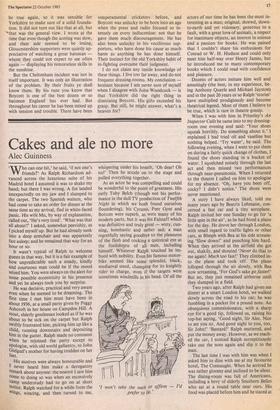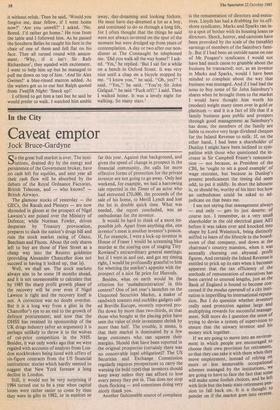Cakes and ale no more
Alec Guinness
Who can one hit,' he said, `if not one's friends?' As Ralph Richardson ad- vanced across the luxurious suite of his Madrid hotel I assumed it was to shake my hand; but there I was wrong. A fist landed unexpectedly on my jaw and I slumped to the carpet. The two Spanish waiters, who had come to take an order for dinner at the same time as my arrival, fled in white-faced panic. His wife Mu, by way of explanation, called out, 'He's very tired'. 'What was that all about?' 1 asked, somewhat peevishly, as 1 picked myself up. But he had already sunk into a deep armchair and was apparently fast asleep; and he remained that way for an hour or so.
It wasn't typical of Ralph to welcome guests in that way, but it is a fair example of how unpredictable such a steady, kindly and courteous man could be if the mood seized him. You were always on the alert for some possible eccentricity in his presence and yet he always took you by surprise.
He was decisive, practical and very aware even when he seemed to be dreaming. The first time I met him must have been in about 1936, at a small party given by Peggy Ashcroft in her house on Campden Hill. A stout, elderly gentleman looked as if he was about to be sick on the carpet but Ralph swiftly frustrated him, picking him up like a child, running downstairs and depositing him in the gutter. Ralph made no comment When he rejoined the party except to apologise, with old world gallantry, to John Gielgud's mother for having trodden on her feet.
His motives were always honourable and I never heard him make a derogatory remark about anyone: the nearest I saw him come to doing so was when an excessively camp understudy had to go on at short notice. Ralph watched for a while from the wings, wincing, and then turned to me,
whispering under his breath, 'Oh dear! Oh no!' Then he strode on to the stage and pulled everything together.
As an actor he was compelling and could be wonderful to the point of greatness. His early Toby Belch (though not his perfor- mance in the dull TV production of Twelfth Night in which we both found ourselves floundering), his Cyrano, Peer Gynt and Bottom were superb, as were many of his modern parts, but it was his Falstaff which was definitive and truly great — witty, cun- ning, bombastic and rather sad; a man regretfully saying goodbye to the pleasures of the flesh and cocking a quizzical eye at the foolishness of all men, including himself. Whatever Ralph touched he im- bued with nobility. Even his famous motor- bike seemed like some splendid, black, mediaeval steed, champing for its knightly rider to charge, even if the targets were sometimes windmills in his head. Of all the
'I won't take the oath or affirm — I'd prefer to lie.' actors of our time he has been the most in- teresting as a man; original, shrewd, down- to-earth and yet visionary, generous to a fault, with a great love of animals, a respect for inanimate objects, an interest in science and a passion for books. He was pained that 1 couldn't share his enthusiasm for Conrad or W. H. Hudson and could only meet him half-way over Henry James, but he introduced me to many contemporary books which I could read with confidence and pleasure.
Dozens of actors imitate him well and amusingly (the best, in my experience, be- ing Anthony Quayle and Michael Jayston) and in the past 20 years or so Ralph 'stories' have multiplied prodigiously and become theatrical legend. Most of them I believe to be true, which is rare in theatre gossip.
When I was with him in Priestley's An Inspector Calls he came into to my dressing- room one evening and said: 'Your shoes squeak horribly. Do something about it.' I explained I had tried oil and vaseline but nothing helped. 'Try water', he said. The following evening, when I went to put them on during a fairly quick change of clothes, I found the shoes standing in a bucket of water. I squelched noisely through the last act and then missed two performances through near-pneumonia. When I returned to the theatre I called on him to apologise for my absence. 'Oh, have you been off, cocky? I didn't notice.' The shoes were never mentioned.
A story I have always liked, told me many years ago by Beatrix Lehmann, con- cerned a fast car and a tiny aeroplane. Ralph invited her one Sunday to go for 'a little spin in the air', as he had hired a plane for the day. He drove her through London, with small regard to traffic lights or other cars, at 80mph with Bea at his side scream- ing 'Slow down!' and punching him hard. When they arrived at the airfield she got out, shakily, and shouted 'Never do that to me again! Much too fast!' They climbed in- to the plane and took off. The plane lolloped through the air slowly, with Bea now screaming, 'For God's sake go faster!' But no, they just remained airborne until they slumped in a field.
Two years ago, after Ralph had given me dinner at a smart London hotel, we walked slowly across the road to his car; he was fumbling in a pocket for a pound note. An obsequious commissionaire, with a sharp eye for a good tip, followed us, raising his top-hat saying, 'Good night, Sir Alec. Nice to see you sir, And good night to you, too, Sir John!' Bastard!' Ralph muttered, and put the money away. However, as we reach- ed the car, I noticed Ralph surreptitiously take out the note again and slip it to the man.
The last time I was with him was when I asked him to dine with me at my favourite hotel, The Connaught. When he arrived he was rather gloomy and inclined to be silent. The dining-room was full of Americans, including a bevy of elderly Southern Belles who sat at a round table near ours. His food was placed before him and he stared at
it without relish. Then he said, `Would you forgive me, dear fellow, if I went home now?' Are you unwell?' I asked. 'No. Bored. I'd rather go home.' He rose from the table and I followed him. As he passed the Southern Belles he caught his foot in the chair of one of them and fell flat on his face. They all turned round with amaze- ment. `Why, if it isn't Sir Rafe Richardson', they sqealed with excitement. I went to help him up but he managed to pull me down on top of him. 'And Sir Alex Gwines!' a blue-rinsed matron added. As the waiters got us to our feet Ralph quoted from Twelfth Night: `Sneck up!'
I offered to get him a taxi but he said he would prefer to walk. I watched him amble
away, day-dreaming and looking forlorn. He must have day-dreamed a lot as a boy, and continued to do so through a long life, for I often thought that the things he said were not always invented on the spur of the moment but were dredged up from years of contemplation. A day or two after our non- dinner at The Connaught he telephoned me. 'Did you walk all the way home?' I ask- ed. 'Yes,' he replied. 'But I sat for a while on a bench in Oxford Street. It was very nice until a chap on a bicycle stopped by me. "I know you," he said. "Oh, yes?" I said. "Yes," he said. "You're Sir John Gielgud." he said "Fuck off!" I said. Then I walked home. It was a lovely night for walking. So many stars.'















































 Previous page
Previous page